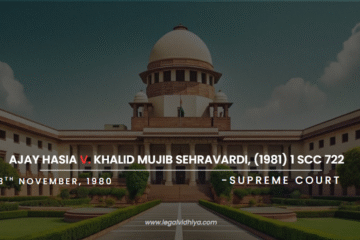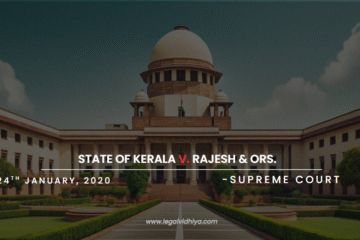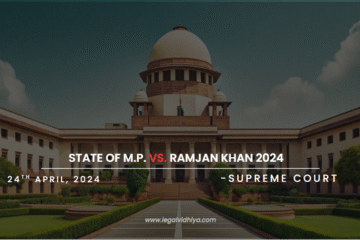
| CITATION | CRIMINAL APPEAL NO. 142 OF 2021AIR 2021 SUPREME COURT 1241, AIRONLINE 2021 SC 99 |
| DATE OF JUDGEMENT | MARCH 01, 2021 |
| COURT | THE HON’BLE SUPREME COURT IN INDIA |
| APPELLANT | KAPIL AGARWAL & ORS. |
| RESPONDENT | SANJAY SHARMA & ORS. |
| BENCH | JUSTICE M.R. SHAH AND JUSTICE DHANAJAYA CHANDRACHUD |
INTRODUCTION
The present criminal case revolves around a business dispute between the parties. The case focuses on the FIR filed by the respondent under section 406/420 IPC against the accused. The case revolves around whether the fresh FIR filed by the respondent with the same allegations against the accused is an abuse of law. Here the concept of abuse of law is referred to; Abuse of process of law refers to the improper or irrational use of court procedures or legal process by a plaintiff or applicant in order to pursue their claim. This claim was raised by the appellant as to the FIR was not justified by the underlying legal action.
Section 420 – “Whoever cheats and thereby dishonestly induces the person deceived to deliver any property to any person, or to make, alter or destroy the whole or any part of a valuable security, or anything which is signed or sealed, and which is capable of being converted into a valuable security.”
Section 406– “Whoever commits criminal breach of trust shall be punished with imprisonment of either description for a term which may extend to three years, or with fine, or with both.”
FACTS:
- M/s Varun Beverages ltd., also known as VBL is a PepsiCo India Pvt Ltd. Franchisee with a licence to manufacture and sell carbonated sweetened water, fruit juice and packaged drinking water under PepsiCo brand. The company of the complainant Sanjay Sharma was designated by the VBL in 2013 as a distributor for the company’s manufactured goods in the Loni district Ghaziabad area.
- The distributor contract was terminated by the company in 2014 which according to appellant non-payment of dues by the respondent the original complainant. According to the appellant, thereafter all claims and security deposits were adjusted, the accounts were reconciled in accordance with the company’s statement of accounts. A sum of Rs.9, 46,280/- was found to be outstanding upon the complainant, towards the material supplied to him.
- The complainant, Sanjay Sharma on 15.09.2014 issued a cheque in favour of the company VBL. The cheque was presented for encashment on 22.09.2014 and the cheque was dishonoured and returned by the banker of the complainant due to “insufficient funds” following the issuance of the required legal notices, the appellant herein filed a criminal complaint on 17.11.2014 under section 138 of Negotiable Instrument Act due to non- payment. The complaint is pending for disposal.
- On 15.09.2014 the respondent filed a complaint against one of the VBL company’s officer namely Vipul Verma alleging misappropriation of Rs. 6, 00,000/-, police then submitted a negative final report on 20.01.2015. The respondent filed another case of misappropriation of Rs. 31, 12,375/- by the appellants.
- Thereafter the respondent filed a complaint under section 156 (3) Cr.P.C. for issuance of direction to police to register FIR against appellant and other officers of the company for misappropriation. Rather than instructing the police to file a formal complaint, the learned magistrate chose to investigate the problem by handling it as a complaint. The learned Magistrate considered the respondent’s application under Section 156(3) Cr.P.C. as a complaint case, and he was given the chance to record his statement under Section 200 Cr.P.C. by order dated 23.03.2015.
- A period of two years, the respondent lodged impugned FIR against the appellant and others under section 406/420 IPC dated on 4.08.2017, the FIR had same/similar to the allegations levelled in the application under section 156 (3) Cr.P.C; which has been waiting to be considered since 2015 by the learned Magistrate.
- Thereafter the appellant approached the High Court under article 226 of the Constitution of India being Criminal Miscellaneous Writ Petition No. 18308 of 2017 for quashing the FIR being case crime No. 790 of 2017 under section 406/420 of IPC. The High Court refused to quash the FIR, observing the impugned FIR appears to have shown the commission of cognizable offence.
- Aggrieved by the order and the judgement passed by the High Court refusing to quash the FIR, the appellant filed a petition before the Supreme Court of India.
ISSUES:
- Whether the FIR was an abuse of process of law?
- Whether the allegations in the FIR disclosed commission of cognizable offences under section 420/ 406 IPC?
- Whether the High Court was correct in refusing to quash the FIR?
CONTENTIONS RAISED BY APPELLANT:
- Learned Counsel for the appellant contended that the impugned FIR is an abuse of process of law to harass the appellant’s by converting a purely civil dispute into a criminal case.
- Learned Counsel for the appellant contended that the respondent left the earlier proceedings pending for two years without participating and filed a fresh FIR with the same allegations. The FIR is filed to get the appellants arrested and extort the money from them.
- It is contended that the respondent entrusted the company with certain monetary amount and the company failed to pay it when asked. In this scenario the company as a whole should be an accused but here the appellants are joined as accuse in their personal capacity. Section 406 of IPC is made out against the company; vicarious liability cannot be extended to the directors and officers of the company.
CONTENTIONS RAISED BY RESPONDENT:
- Learned Counsel for the respondent contended that the FIR discloses commission of cognizable offence, the High Court has rightly refused to quash the FIR, in exercise of power under article 226 of Constitution of India.
- Learned Counsel for the respondent contended that there was no delay in registering of FIR. It is submitted that a delay is a mixed question of fact and law and plea of defence. It is not a thumb rule to quash FIR for delay registration, which can be explained at Trail.
- It was contended that the FIR was not an abuse of process of law. The FIR was filed with the genuine intention of seeking justice and brings light for the alleged wrongful actions committed by the appellants.
JUGEMENT:
In this case the Supreme Court of India held that considering the facts of the case the FIR is an abuse to process of law and/or the same has been lodged to harass the appellant and the High Court has the power to exercise under article 226 of the Constitution of India to quash the FIR or in exercise power under section 482 of CrPC. Under section 482 of CrPc and/or under Article 226 of the Constitution is intended to accomplish the beneficial goal that criminal processes shouldn’t be allowed to turn into a harassing tool. Criminal proceedings may be cancelled if the court determines that they constitute an abuse of the legal system or that the accused is being coerced into giving evidence in the exercise of inherent powers. The statute preserves the High Court’s inherent authority to issue any necessary orders in its capacity as a superior court i) to prevent an abuse of the process of any court ; or ii) otherwise to secure the ends of justice.
The Court in this case observed that the respondent did not proceed further with his application under section 156 (3) Cr.P.C. which is pending before the learned Magistrate for five years. It is also observed that in the FIR, neither there is any reference to the application under section 156 (3) Cr.P.C. which is pending before the learned Magistrate, nor there is a reference of the complaint under section 138 of the Negotiable Instrument Act. Based on these observations the Court held that the impugned FIR is nothing but an abuse to the process of law and said to harass the appellants.
ANALYSIS:
In this case the hon’ble Supreme Court of India set aside the decision of the High Court of refusing to quash the FIR under Article 226 of Constitution of India and Section 482 Cr.P.C. The Court held that the High Court has the power under section 482 Cr.P.C to issue necessary orders if there is an abuse of process of law or court; to secure justice. In this case the Court held that the FIR registered as Case Crime No. 790 of 2017, under section 406/420 IPC, with the police station Loni Border, District Ghaziabad is an abuse of process of law, as there is no basis to the FIR which is filed with the same/similar allegations as the previous once. The Court observed that the FIR was an attempt to harass the appellants by converting a civil dispute into a criminal case.
The purpose of section 482 Cr.P.C is that the High Court’s have the authority to step in and prevent cases or complaints that are brought with the intention of harassing someone or with malicious intent. The High Courts can also guarantee that procedural problems do not prevent or postpone justice. The High Court may exercise its inherent authority to stop criminal proceedings, such as complaints and First Information Reports, and to shield innocent people from being unjustly accused in criminal cases when there is insufficient evidence to prove their innocence.
In certain cases there is misuse of this section to scuttle investigations such as the defendant or the accused may file Section 482 petitions primarily to delay or impede the investigation or prosecution that is currently underway against them. Even if there are good reasons for the inquiry or prosecution, they could try to use this clause to stop the legal process. In this case the respondent has already a proceeding pending for two years before the Magistrate and in spite of that the respondent filed another FIR to delay the legal proceedings and was an attempt to harass the appellants.
The Court laid down guidelines for quashing FIR in cases where the dispute is essentially civil in nature, and observed that the courts should be cautious in quashing FIR and should only do so in cases where the allegations are essentially civil in nature.
CONCLUSION:
In this case the Court granted relief to the appellants, and quashed the FIR, ending their criminal prosecution. The judgement serves as a precedent for similar cases where FIRs are filed in civil disputes, and reinforce the principle that criminal law cannot be used to settle civil disputes or to harass individuals. The Court in this case redefined the power of the High Court under section 482 Cr.P.C. and Article 226 of Constitution for quashing the impugned FIR.
REFERENCE:
- https://indiankanoon.org/doc/97191348/
- SCC Online
- Section 420 Cr.P.C.
- Section 406 Cr.P.C.
- https://www.lexology.com/library/detail.aspx?g=3b46c5ad-bd59-44ca-a94b-dffdeb755227
Case Analysis written by
Name- Purva Kamlesh Todankar
Course- B.A LLB
College- VES College of Law.
Disclaimer: The materials provided herein are intended solely for informational purposes. Accessing or using the site or the materials does not establish an attorney-client relationship. The information presented on this site is not to be construed as legal or professional advice, and it should not be relied upon for such purposes or used as a substitute for advice from a licensed attorney in your state. Additionally, the viewpoint presented by the author is of a personal nature.




0 Comments